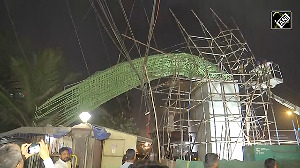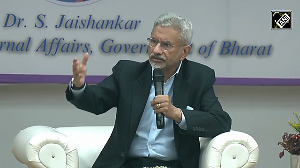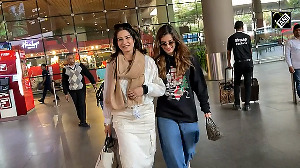In their blind race to meet targets, non-governmental organisations involved in restoration of livelihood in these worst tsunami-hit districts are providing sub-standard boats to survivors, prompting the administration to issue strict guidelines to arrest the practice.
Be it Samanathanpettai in Nagapattinam district or Devanampatttinam in Cuddalore, most of the Fibre Reinforced Plastic boats provided by these voluntary organisations are lying unused on the beaches, with fishermen reluctant to venture into the sea in them.
"I find the boat useless. It doesn't have any balance in the choppy sea. Besides, water enters it most of the time," says Satyaraj, a fisherman in Samanthanpettai. "These boats were launched by the authorities with much fanfare in June, but a few days later, we found they cannot be used."
The administration, while admitting to lapses in checking the quality of boats provided by NGOs, maintains that strict directives are being issued regarding its manufacture.
"Our initial aim was to enable the fishermen to venture into the sea after the tsunami. This was very much needed in order to revive the sagging coastal economy. In the process, some lapses in quality of boats supplied by certain NGOs were detected," J Radhakrishnan, Nagapattinam District Collector told PTI.
"However, we have now asked the NGOs supplying boats and nets to register with the Fisheries Department and subject their manufacturing methods to official scrutinty," he said.
Similarly, in the badly-hit fishing hamlet of Devanampattinam in nearby Cuddalore district, around seven boats provided by NGOs were found by the authorities as unfit for use.
"In the initial batch of boats supplied by NGOs, we did spot more than half-a-dozen boats that were not fit for use by the fishermen due to inferior quality. These boats had been sourced by the concerned NGO from Andhra Pradesh," Gagandeep Singh Bedi, Cuddalore District Collector told PTI.
"These volunatary organisations have been asked to involve the community in the manufacturing process and to seek their suggestions, needs and requirements," he said.
According to SIFFS, a fisherman community-based organisation active in the manufacture of boats all over South India since the mid-80s, the NGOs' 'hurry in meeting targets' were responsible for compromise in quality.
"With more and more NGOs voluntarily coming up to supply boats to the survivors, there has been a mad scramble as to who would come first. In the process, many boats of inferior quality have been supplied, not taking into consideration the real requirements of fishermen," says Ephrem, regional head of SIFFS.
However, the indiscriminate supply of boats has also thrown up another problem. In some villages, all fishermen are
now boat owners, leading to an acute shortage of workforce.
"Earlier, there used to be one boat and around four to five beneficiaries. With the arrival of more and more boats, the situation has changed and everyone is an owner rather than a worker," says Ephrem.
"This recent development has had an effect on the sociological level also. The feeling of collective ownership and unity, which was present among the fishermen community has also taken a backseat with indiscriminate supply of boats and nets," he says.
Complete coverage: Tsunami - Waves of destruction






 © 2025
© 2025